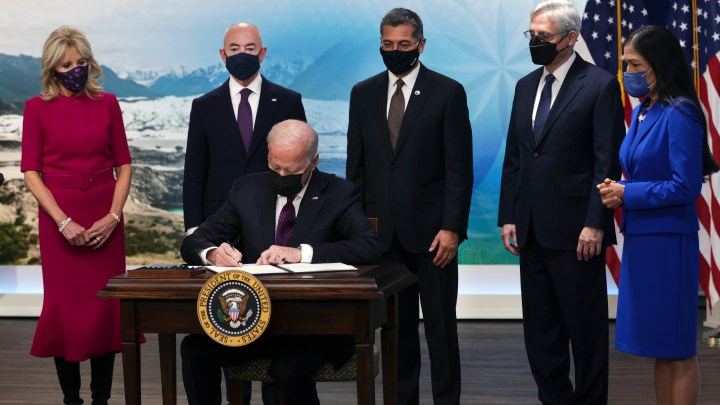
Native leaders raise economic issues at First Nations Summit
Native leaders raise economic issues at First Nations Summit

The White House Tribal Nations Summit convened for the first time since the Obama years on Monday, as President Joe Biden had some electronic face time with tribal leaders.
One big economic issue on the agenda for the two-day event is tribal health care and how decades of underinvestment in the federal Indian Health Service has made tribal communities especially vulnerable during the pandemic.
During his opening remarks at the Tribal Nations Summit, Biden acknowledged the disproportionate impact of COVID-19 on tribal communities.
“Native Americans contracted the virus at over three times the rate of white Americans, nearly twice the rate of lives lost,” he said. That’s due in part to high rates of pre-existing illnesses among Native people.
In a roundtable, Amber Torres, chair of the Walker River Paiute Tribe, said many of those illnesses were preventable.
“As a tribal leader, our requests continue to be the same for the past 20 years, such as full funding for the IHS.” That’s the Indian Health Service, the federal agency that delivers health care to Native Americans.
The House Appropriations Committee has proposed boosting the Indian Health Service’s 2022 budget from $6.2 billion to $8.1 billion. But that’s still a fraction of the $48 billion that tribal leaders say it would take to meet their communities’ health care needs.
“I truly feel that if these requests had been honored, Indian Country would have been better prepared for the COVID-19 pandemic,” Torres said.
Cheryl Andrews-Maltais, who chairs the Aquinnah Wampanoag tribal council, wants to see a more accurate collection of health data related to Native people.
It’s been hard to know how many urban tribal members have been vaccinated since nontribal health care providers haven’t been tracking it, she said.
“For the most part, particularly in the Northeast, they weren’t asking,” she said.
Another problem that she said needs federal attention: boosting the number of Indian health care centers in cities, “for tribal members that live outside of our reservation areas,” Andrews-Maltais said.
That describes most Indigenous people in this country, according to the IHS. But less than 1% of the agency’s budget goes to urban Indian health care.
There’s a lot happening in the world. Through it all, Marketplace is here for you.
You rely on Marketplace to break down the world’s events and tell you how it affects you in a fact-based, approachable way. We rely on your financial support to keep making that possible.
Your donation today powers the independent journalism that you rely on. For just $5/month, you can help sustain Marketplace so we can keep reporting on the things that matter to you.











